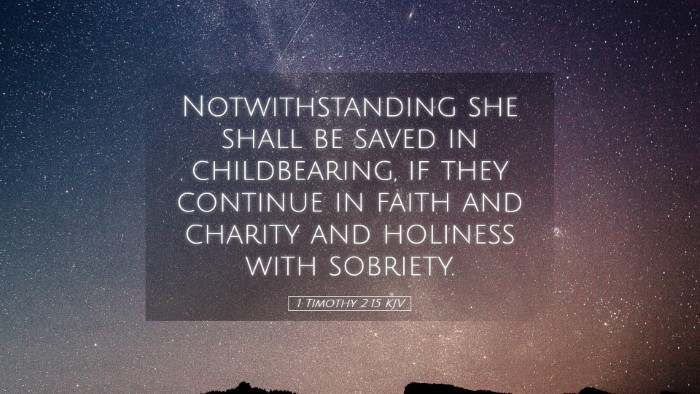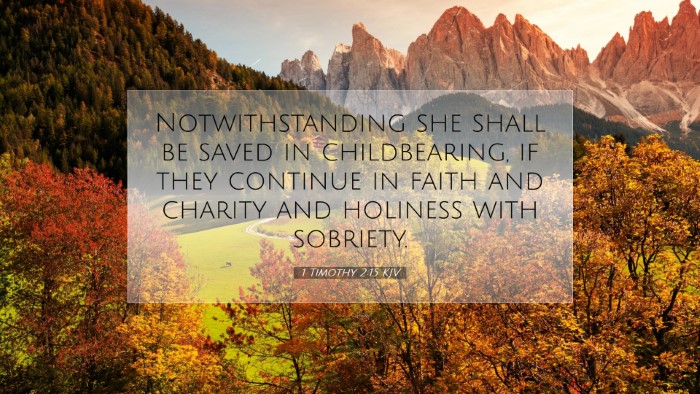Old Testament
Genesis Exodus Leviticus Numbers Deuteronomy Joshua Judges Ruth 1 Samuel 2 Samuel 1 Kings 2 Kings 1 Chronicles 2 Chronicles Ezra Nehemiah Esther Job Psalms Proverbs Ecclesiastes Song of Solomon Isaiah Jeremiah Lamentations Ezekiel Daniel Hosea Joel Amos Obadiah Jonah Micah Nahum Habakkuk Zephaniah Haggai Zechariah Malachi1 Timothy 2:15
1 Timothy 2:15 KJV
Notwithstanding she shall be saved in childbearing, if they continue in faith and charity and holiness with sobriety.
1 Timothy 2:15 Bible Commentary
Commentary on 1 Timothy 2:15
1 Timothy 2:15 states:
"Nevertheless she will be saved in childbearing if they continue in faith, love, and holiness, with self-control." (1 Timothy 2:15, NKJV)
Introduction
This verse presents a complex and frequently debated topic within the realm of biblical interpretation. It addresses the role of women in the church and suggests a divine design wherein women find fulfillment and spiritual significance through motherhood and their respective responsibilities within the family structure. Here, we will explore insights from public domain commentaries by Matthew Henry, Albert Barnes, and Adam Clarke to draw a holistic understanding of this verse.
Contextual Analysis
Before delving into the specifics of verse 15, it is crucial to recognize the context of Paul's letter to Timothy. This epistle is instructive, providing guidelines for church leadership and the behavior of its members. Paul emphasizes the importance of prayer, sound doctrine, and the roles within the church, leading to a discussion about women's roles in the assembly.
Insights from Matthew Henry
Matthew Henry provides a detailed examination of 1 Timothy 2:15, focusing on the salvific implication regarding women and childbearing. He interprets "saved in childbearing" as a protective promise where women who fulfill their motherly roles can find spiritual security.
- Motherhood as a Vocation:
Henry suggests that motherhood is an honorable calling that carries a unique significance in the spiritual realm. Childbearing is seen not merely in a biological sense, but as a nurturing process that can lead to spiritual salvation.
- Faith and Holiness:
He emphasizes that the hope of salvation in childbearing comes coupled with the need for continued faith, love, and holiness. Thus, the spiritual health of the family often reflects the mother’s own discipleship and character.
Insights from Albert Barnes
Albert Barnes offers a more nuanced interpretation, focusing on the phrase "if they continue." He sees this as a conditional statement that underlines perseverance in faith and moral conduct.
- The Conditional Nature:
Barnes explains that Paul’s assurance of salvation through childbearing is dependent on the continuation in faith and good works. The mother’s devotion not only benefits her personally but extends to her children and family unit.
- The Role of Women in Society:
Additionally, Barnes emphasizes that this verse does not imply a limitation of women to the domestic sphere, but rather highlights the importance of their role within the broader context of God’s plan for humanity.
Insights from Adam Clarke
Adam Clarke provides an extensive analysis that integrates both linguistic and cultural studies. He delves into the Greek terms used in the passage and their implications.
- Examination of Terms:
Clarke notes that "saved" can be understood as a negative aspect, referring to the safety and preservation of women from cultural stigmas associated with childbearing in ancient society. This reflects the overarching theme of dignity in the role of women in the early church.
- Broader Theological Implications:
His commentary touches on the theological ramifications of this passage, positing that the family’s stability is to be championed as a cornerstone of Christian life and witness. Moreover, it supports the idea that God’s providence allows women to enact courage and faith through their responsibilities.
Theological Reflection
This exploration of 1 Timothy 2:15 through the lenses of these notable commentators reveals several key theological reflections.
- The Value of Motherhood:
The salvation mentioned in this verse speaks to the deeper work of God within the framework of familial and relational dynamics. The role of motherhood is elevated beyond mere biological processes to that of a spiritual calling.
- Christian Community and Responsibility:
This passage also calls for the community to support women in their various roles, recognizing the profound influence that faith, love, and holiness have on raising the next generation of believers.
- Cultural and Historical Context:
Understanding the historical and cultural setting of the early church helps to clarify the social implications of this verse, affirming the necessity of a supportive environment that honors the contributions of women.
Conclusion
In conclusion, 1 Timothy 2:15 presents a rich and intricate understanding of women's roles in the church and family. Through the combined insights of Matthew Henry, Albert Barnes, and Adam Clarke, we see that the message of salvation in childbearing is profoundly tied to faith, love, and holiness. This verse serves not only as an encouragement to women but also as a call to the church to cultivate an environment that recognizes and values the contributions of women in all aspects of life.


